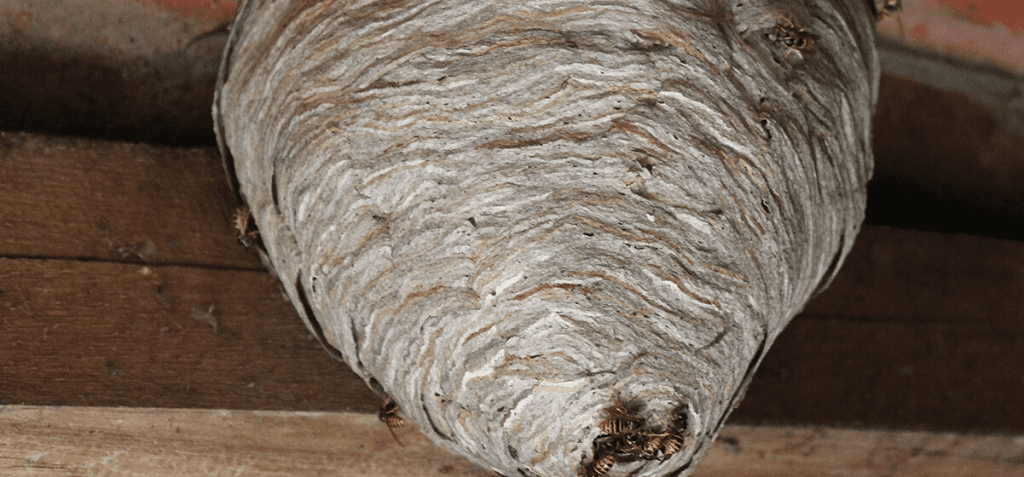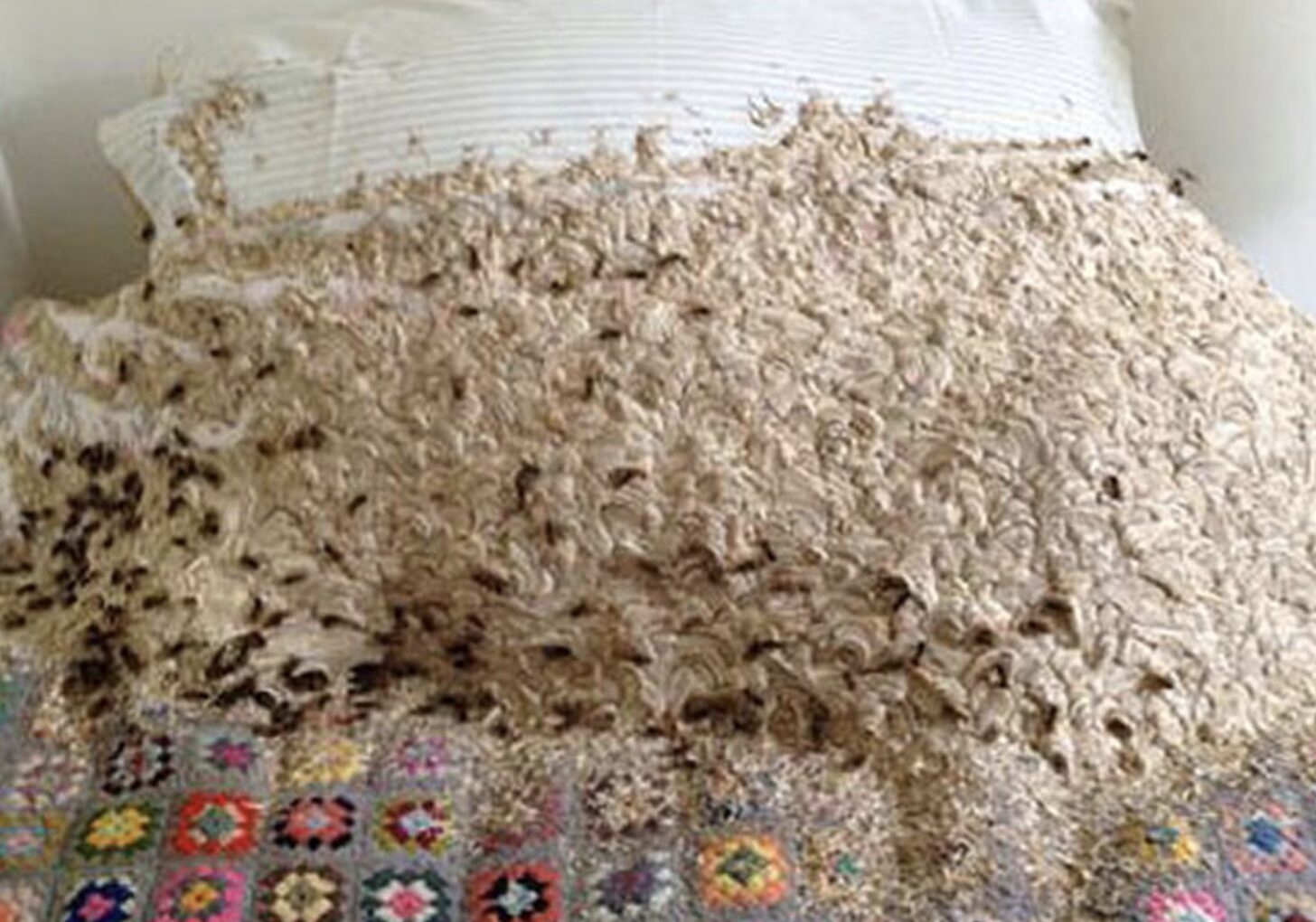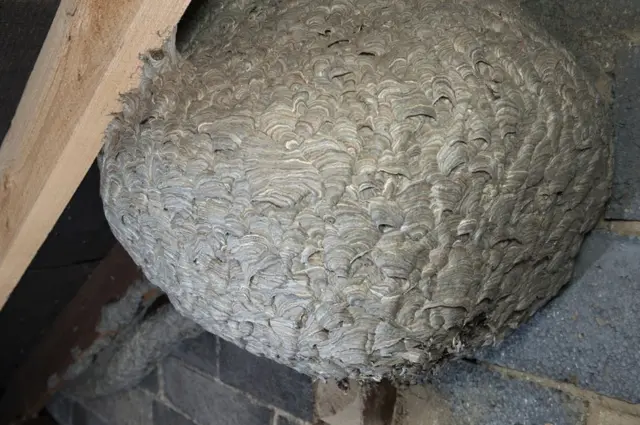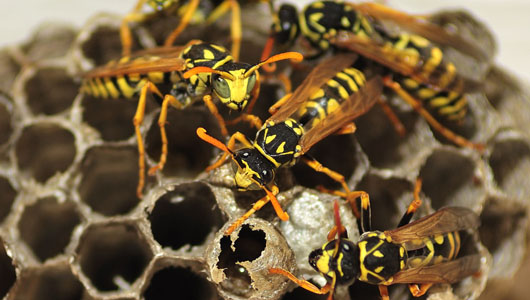Have you ever dealt with an unwanted pest in your home? Maybe a few ants here or a spider there? Now, imagine discovering a massive wasp colony in your spare room! For one homeowner in Winchester, Hampshire, UK, this nightmare scenario became a reality. What started as an ordinary day ended with a shocking revelation of thousands of wasps inhabiting her unused room, leading her to call in a seasoned pest controller who described it as one of the most unusual cases of his 45-year career.
The Startling Discovery: A Room Overrun by Wasps

Most people use a spare room for storage or the occasional guest, but for this Winchester resident, it became a nesting ground for wasps. She was completely unaware that her spare room had been taken over by these buzzing invaders, who had managed to build an enormous nest right under her nose. The nest was anything but ordinary; it measured nearly a meter wide and 30 centimeters deep, housing an estimated 5,000 wasps!
When Wasps Invade: The Season for Pests
Wasps, like many other pests, are more active in warmer months as they seek shelter, food, or nesting sites. While it’s common to find small wasp nests around a porch, in a shed, or near a roof, a nest of this size, built inside a home, is a rare and unnerving sight. John Birkett, a pest controller from Longwood Services, was called to handle the infestation, which he described as the largest he’d ever seen inside a house. Not only did the homeowner want the wasps removed, but she also hoped to salvage a comforter of sentimental value that the insects had built their nest around.
An Explosion of Wasps: The Challenge of Removing the Nest
When Birkett attempted to carefully remove the comforter wrapped around the nest, he triggered a furious response from the colony. He described the experience as an “explosion of wasps”—a nightmarish scenario for anyone with a fear of insects. Even as an experienced pest controller, Birkett admitted that dealing with such a large and aggressive colony required precision and a cool head.
“I had to think carefully about how to handle this,” Birkett explained, adding that he couldn’t leave the door open too wide for fear of letting wasps escape into the rest of the house. Armed with protective gear and specialized pest control spray, he managed to contain the situation within an hour, finally bringing the nest under control.
The Nest’s Impact: Chewed Furniture and Structural Damage
Once the wasps were neutralized, Birkett examined the nest and the destruction left behind. The insects had not only taken over the spare room but had also chewed through the mattress and wooden bed pillars. Wasps are known to chew on wood to create the pulp needed for nest building, and in this case, they’d wreaked havoc on the furniture, transforming it into their base of operations.
Birkett remarked that the nest, though a “wonderful piece of art” in terms of structure, had caused extensive damage to the homeowner’s belongings. While wasp nests can be fascinating from a design perspective, the devastation left behind in this instance was nothing short of a homeowner’s nightmare.
The Dilemma of a Pest Controller: Mixed Feelings on Extermination
Despite his success in removing the nest, Birkett admitted to feeling conflicted about exterminating such a large colony. Wasps, often seen as pests, actually play an important role in controlling insect populations. However, in this situation, the nest posed a clear risk to the homeowner’s safety and property, making removal the only option.
“It’s tough because you don’t want to kill anything, but you have to do it because they were a pest,” Birkett explained, capturing a common dilemma faced by pest controllers: respecting nature while prioritizing human safety.
How Wasps Build Nests and Why They Choose Indoor Spaces

Wasps build their nests using wood pulp, which they make by chewing on wood surfaces to create a paper-like material. In the wild, they often nest in trees or other sheltered outdoor areas. But in urban settings, they sometimes find attics, wall cavities, or, in this case, an unused room as ideal spots for nesting. Indoor spaces can offer warmth, shelter, and an undisturbed environment, allowing a colony to thrive. This may explain why the homeowner’s spare room, a secluded and quiet space, became an attractive home for the wasps.
The Importance of Professional Pest Control
In extreme cases like this, professional pest control is essential. Attempting to handle a large wasp nest on your own can be dangerous, especially in enclosed spaces where wasps can easily feel threatened and swarm in defense. Pest controllers, equipped with protective suits and specialized tools, are trained to manage wasps safely while preventing them from spreading to other areas of the home.
If you suspect a wasp nest in your home, it’s best to call a professional instead of trying to deal with it yourself. Even a slight disturbance can provoke a defensive reaction, leading to painful and potentially dangerous stings.
How to Prevent Future Wasp Nests Indoors

While it’s impossible to completely prevent pests from entering your home, there are proactive steps you can take to reduce the risk of a wasp infestation:
- Seal Cracks and Openings: Wasps can enter through the tiniest gaps, so inspect windows, doors, and vents to ensure they’re properly sealed.
- Maintain Outdoor Spaces: Wasps are attracted to food and sweet scents. Keeping trash cans covered, cleaning up food spills, and removing fallen fruit around your property can help deter them.
- Keep Indoor Spaces Dry: Moist areas attract insects. Check for leaks and ensure attics, basements, and spare rooms are well-ventilated to discourage wasps from setting up shop.
- Schedule Regular Pest Inspections: Annual pest inspections can help catch infestations before they become severe, allowing you to address small issues before they become large problems.
Conclusion: A Reminder of Nature’s Power Inside Our Homes

This story of the massive wasp nest in Winchester reminds us of the resilience and power of nature, even within the confines of our homes. While we like to think of our living spaces as secure and private, sometimes even the most protected areas can become havens for unexpected visitors. The homeowner in this case was fortunate to have a seasoned professional like John Birkett handle the situation, ensuring her safety and restoring her home.
For those of us who dread the thought of even a single wasp indoors, let alone thousands, this tale serves as a valuable lesson in vigilance. Regularly inspecting unused spaces, addressing pest issues early, and calling professionals when needed can help protect our homes from becoming nature’s latest construction site. In the end, a little preventative care can go a long way in ensuring our homes remain safe and pest-free.


